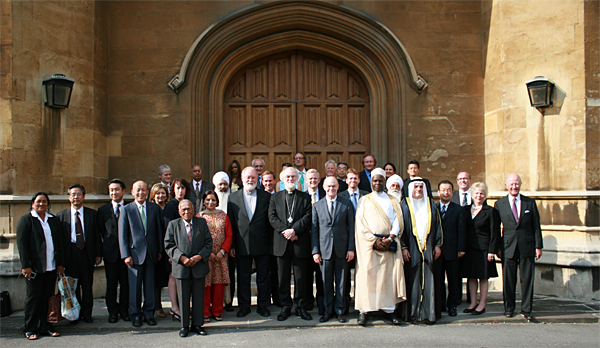Archbishop and Religious Leaders call for Cooperation to Combat Poverty and Achieve Millennium Development Goals
Monday 9th June 2008
The Archbishop of Canterbury, Dr. Rowan Williams, today hosted religious leaders of different faiths to discuss the power of multi-religious cooperation to combat poverty and achieve the United Nations Millennium Development Goals.
Religions for Peace Trustees at Lambeth Palace
Dr Williams is a Co-President of Religions for Peace, the largest multi-religious coalition.
"Mobilizing the world's religious communities in common action is critically important at a time when the human family faces grave threats to peace, such as violent conflict, extreme poverty, and climate change," Dr Williams said in his address to members of the global Religions for Peace network at Lambeth Palace. "If the international community is to meet its collective commitment to halve poverty and hunger by 2015, religious communities must work together on the basis of shared moral concern and marshal their considerable capacity for advocacy and for service delivery, particularly in the field of education, to alleviate poverty," the Archbishop said, observing that UK religious leaders and Anglican bishops from around the world will join in a Walk of Witness in London on 24 July to demonstrate their determination to help end extreme poverty across the globe[1].
The Archbishop highlighted the potential of faith-based education to create a culture of peace and spoke out against violence targeting religious communities and institutions.
"When prominent religious leaders of all faiths, like the Archbishop of Canterbury, exercise their moral authority by speaking out and acting together, they can have a decisive impact on issues such as violent conflict, extreme global poverty and deteriorating food security," said the Very Rev. Leonid Kishkovsky, Moderator of Religions for Peace and Director of External Affairs for the Orthodox Church in America. "Multi-religious cooperation is essential for building peace wherever it is threatened."
"Extreme poverty is an affront to human dignity," said H.E. Sheikh Shaban Mubaje, Grand Mufti of the Uganda Muslim Supreme Council and a Co-President of Religions for Peace. "The collective reach and moral authority of religious leaders of different faiths is great, and so is our responsibility to work together to end poverty and achieve true Peace."
Meeting participants included Buddhist, Christian, Jain, Jewish, Muslim, Sikh and Zoroastrian members and International Trustees of the Religions for Peace network from Europe, Africa, Asia, North America and the Middle East
Members and International Trustees of the global Religions for Peace network discussed multi-religious efforts to advance the Millennium Development Goals (MDGs). The Goals, adopted by the United Nations in 2000, set concrete targets for halving poverty and hunger by 2015, ensuring universal primary schooling, reducing child and maternal mortality and infectious diseases, improving environmental sustainability and achieving gender equality and women's empowerment.
"The injustice of extreme poverty falls most heavily on women – 70 percent of the nearly 3 billion people living on less than $2 a day are women and girls," noted Mrs. Aruna Oswal, Vice President of the World Jain Confederation and a Co-President of the Religions for Peace World Council. "Supporting the advancement of women and girls is essential if we are to end extreme poverty and achieve the UN Millennium Development Goals."
Advancing human development is a focus of Religions for Peace. Multi-religious action through the Religions for Peace network includes:
- National Inter-Religious Councils working on behalf of the poor, the sick and the most vulnerable, and delivering services directly to those most in need;
- Co-founding the pioneering Women, Faith and Development Allianceto increase global investments in women and girls;
- Partnering with the United Nations Commission on the Legal Empowerment of the Poor to help raise awareness of legal rights and promote an inclusive notion of justice for all; and
- Building the capacity of religious leaders and communities to become advocates for the MDGs in their own communities. (Religions for Peace's Millennium Development Goal Toolkit for Religious Leaders is available at http://www.wcrp.org.)
"By advancing common action among the world's religious communities, Religions for Peace engages the moral leadership of the world's religious leaders and mobilizes the vast social networks of the world's religious communities," said Dr. William F. Vendley, the Religions for Peace Secretary General. "The resources of religious communities are often overlooked by governments and non-governmental organizations, but religious communities and their leaders can be powerful actors on the front-lines combating poverty and advancing development."
